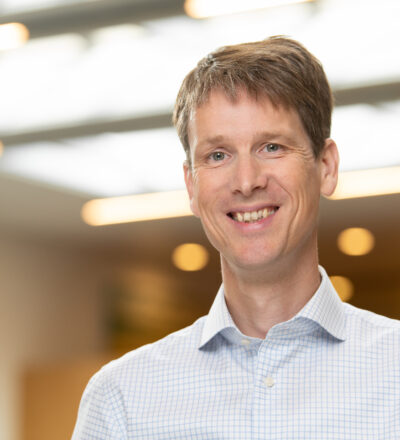Victor Salet, Chief Operating Officer at HyCC, is dedicated to advancing innovative solutions for the energy and material transitions with a focus on green hydrogen. In this interview, Victor shares insights into HyCC’s collaborative efforts and strategic initiatives aimed at driving sustainability and paving the way for a green and safe future economy.
Name: Victor Salet
Function: Chief Operating Officer HyCC
Organization: HyCC
Works with ISPT on: various projects of the Hydrohub Innovation Program

What do you see as the greatest opportunity for innovations in the energy transition?
“At HyCC, we focus on driving the energy transition, with a special emphasis on advancing the use of green hydrogen within both the energy and material transitions. From this point of view, we see many innovation opportunities. For example, we acknowledge that through system integration, we can significantly reduce overall grid costs for society. This can be achieved by limiting grid congestion and thereby supporting the balancing of the entire electricity system. Another key area of opportunity is the advancement of more efficient and flexible water electrolysis technologies. By accelerating economies of scale, we can significantly reduce the costs associated with implementing these technologies. Ensuring safe and reliable designs across the entire technology value chain also represents crucial innovation opportunities. Next to optimizing raw material usage in water electrolysis and enhancing water management and treatment practices.”
What does the industry need to accelerate the transition to a circular and CO2-neutral economy?
“What is most vital is that we develop a long-term perspective for our future economy, moving beyond the current focus solely on decarbonization. Instead, we should concentrate on shaping the economy we aspire to have. This necessitates more support for facilitating essential technologies and companies within this future economy, underpinned by a solid regulatory framework. Efficient permitting processes and appropriate subsidies are also imperative to support new targets. Achieving this requires an interdisciplinary approach involving both government and industry. We strongly believe that a significant green hydrogen economy, powered by renewables, is the pathway forward.”
There should be no competition when it comes to safety: it is the responsibility of all stakeholders involved.
Victor Salet, Chief Operating Officer HyCC
Which values does partnering up with ISPT bring you and your company?
“Partnering with ISPT means access to a network of companies working on pre-commercial issues and leading to critical insights on technology themes. Besides, Subsidy Open Innovation is cost effective and brings new insights to light for all participating parties. To give an example, in the field of safety, our consortium strives to create a level playing field by attempting to define the same requirements and conditions for the industry. We do this together. Partnerships are essential to realizing a sustainable future for the industry. The entire ecosystem must be interconnected, necessitating learning as a collective. Insights on safety must be shared openly. There should be no competition when it comes to safety; it is the responsibility of all stakeholders involved. We believe that by sharing knowledge, development, and costs, we can not only increase our impact but also accelerate the pace of impactful change.”
What are currently the most promising technologies and innovations in sustainable process technology? And how is your company involved in realizing these innovations?
“We are actively engaged in various promising technologies and innovations within the field of sustainable process technology. This includes initiatives such as scaling up water electrolysis while ensuring safety. An important challenge we face is achieving autonomous and flexible operation. At HyCC, our goal is to develop, own, and operate these assets. We have a pipeline of projects in both the Netherlands and Germany, ranging from 20 to hundreds of megawatts, with the aim of supplying industrial customers with green RFNBO-certified hydrogen.”
